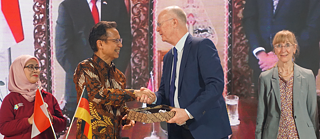Skilled Workers from Abroad
Increasing Demand

The Goethe-Institut has been involved in the area of training and advising skilled workers from abroad since 2007. In interview, Ulrike Drißner, Director of Language Work in Southeast Asia, and Regional Director Stefan Dreyer talk about limits to capacity and transparent recruitment processes.
Ms. Drißner, as Director of Language Work in Jakarta with regional responsibility for Southeast Asia, training for skilled workers is a big part of your role. What are your objectives in the region?
U. D.: Since 2019 we have noticed that the demand for qualified personnel is no longer focussed exclusively on healthcare workers. We have received initial enquiries for language training in the hotel and restaurant sector from both Germany and other guest countries. Interest in the area of dual training schemes also rose steadily. At a regional level, we offer services to recruiting institutions, such as the German Association for International Cooperation (GIZ) in the context of the “Triple Win” programme and the German Hotel and Restaurant Association of Baden-Württemberg, and we offer tailor-made linguistic training and intercultural preparation. From April of this year, the “Skilled Workers Competence Centre” has been in place in Bandung to bring together the knowledge in the region and to give this area of work a broader base and drive it forward, we will soon reach the limits to our capacity in view of the increasing demand, despite continuous teacher training. We are therefore increasingly looking for opportunities to integrate language qualifications into the national education systems.
Mr. Dreyer, what role can the Goethe-Institut play in the migration
of skilled workers?
S. D.: The Goethe-Institut can play a significant part in the integration of skilled workers in Germany who are linguistically and interculturally well prepared, creating a success story for both migrant workers and employers. But we also stand for fair and transparent recruitment processes and standards and for cooperation through partnerships with other German institutions.
A memorandum of understanding was signed at the beginning of the year between the Goethe-Institut and the Indonesian Ministry of Health. What does that cooperation entail?
S. D: The cooperation with the Indonesian Ministry of Health primarily involves integration of linguistic and intercultural training into courses for Indonesian healthcare workers. The vision is to set up an “international class” with German on the curriculum. Over the four-year course, the healthcare trainees can then achieve the B2 level and therefore already take up employment in Germany with the necessary language certificate. This is a much better learning option than additional language training alongside a career. In any case, anchoring German in national education systems is a priority for the Goethe-Institut; in this respect, it was a short-term win-win situation. The Indonesian side is also co-financing the pilot project, which has now begun.
How will the project continue?
U. D.: We are currently in the process of developing teaching materials in line with the Indonesian training curriculum. At the same time, material is being developed which integrates healthcare jargon into the language teaching from the outset. In September we are then starting the language teaching with two pilot classes – one in Bandung and one in Jakarta – with teachers from the two Goethe-Instituts. In parallel, we are looking for a university at which we can train linguistically and methodologically well-qualified teachers so that, in the long term, Indonesian teachers can take over the language teaching at all 38 health polytechnics. We cannot do this solely with the teaching staff at the institutes in Bandung and Jakarta – the polytechnics are spread around the entire Indonesian archipelago.